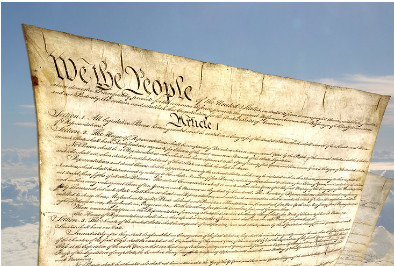But okay, let’s look at the one we’ve got. Some things stand out. Let’s start with the item you tripped over, the power given to Congress to regulate commerce with foreign nations, Indian tribes, and between the states. That was a problematical idea from the get-go. There should be separation of economy and state for the same reason that we have separation of church and state. And there should be a separation of state and education, and everything else that might be provided by society. Otherwise the state will insinuate itself and eventually try to usurp the whole area.
Even though the founders’ idea of “regulate” was very different from the current one of total control, it left the door open to misinterpretation. In those days it meant simply to “make regular” or to normalize. The idea, as I understand it, was to ensure a level playing field between the states, since some of the states had sweetheart deals with some states and trade barriers with yet others, greatly complicating business concerning them all. Over the years, this concept has devolved into a blanket power to control every minute detail of any good or service that might cross state lines – or might not even do that, but could affect prices in other states simply by existing wherever it is. What was a very reasonable intent has opened Pandora’s box. And now corporatists, lobbyists, bureaucrats, and influence-peddlers completely control the coercive power of the state and use it to destroy their competition and enrich themselves.
L: As opposed to beating the competition in a fair contest in the marketplace.
Doug: Yes; we’re told competition is supposed to be “fair,” not “cutthroat” – although both terms are ridiculous misnomers. But Article I, Section 8 is full of things that have been perverted or really shouldn’t be there to start with. It says the Congress has the power to coin money and regulate its value, as well as establish weights and measures. Any sensible person could have told the guys who wrote this that that’s like asking the fox to guard the henhouse. Money is a market phenomenon that’s quite capable of orderly evolution in a free-market environment. Governments are not necessary to establish money and should never be trusted with a monopoly power over money – when they have it, they always abuse it and debase the currency. It happened in ancient Rome and has happened again and again throughout history; it’s the easiest – but also the most destructive – way for the state to get revenue.
L: Fine, but you’re an anarchist, and the writers of the Constitution were not. They were practical men of their day, trying to set up a system they thought would work. Keeping the state’s grubby hands off the money supply was not an idea they would have been familiar with…
Doug: Not really. Bank notes back then were issued by private companies – banks, gold- and silversmiths, and such. They issued notes stating that so-and-so had X amount of gold or silver on deposit. Many people used all sorts of gold and silver not issued by nor regulated by their local governments for money. If memory serves, in the original colonies that formed the United States of America, Spanish pieces of eight were among the most common items used for money.
The framers of the Constitution should have known better. And maybe they did; the Constitution gives Congress the power to coin money, but it doesn’t forbid anyone else from doing the same thing. So anyone could have gone into the business of minting coins for use as means of exchange and stores of value. The market would decide which were the most reliable.
L: I wonder when and how competing with the government on that front became a crime.
Doug: I’m not sure it is, even today. What the government has done to people who’ve issued private money in recent times, like the creators of the Liberty Dollar, is to prosecute them for counterfeiting, which is spelled out as a crime in the Constitution – but only if you counterfeit the currency of the United States. During the War Between the States, a printer in Philadelphia hit upon the idea of counterfeiting Confederate currency and made a huge amount of money for himself. He was never prosecuted. Washington overlooked it because it aided its war effort. But by late in 1863 it was no longer even worth the man’s effort, because the Confederate dollar had lost so much value – due mostly to the foolish policies of the Confederate government in Richmond. I suspect that was a major, but generally overlooked, contributing factor to the collapse of the South.
L: I’ve long thought the North’s victory was largely economic, not military. “Unconditional Surrender” Grant’s bloody march into Virginia was an insanely expensive way to beat Lee. Anyway, you may be right about counterfeiting, but everyone has gotten the message: Money is the state’s turf, and woe unto ye if you trespass.
Doug: Yes, we live on a prison planet. Trapped here by the aberrations of human psychology.
L: So, what else would you list among Doug Casey’s top ten gripes with the US Constitution?
Doug: The provision to establish post offices and post roads. The post office is a paragon of inefficiency and bad service, was never necessary as a government function, and absolutely should never have been a monopoly. And the first roads in America were private toll roads.
L: I remember reading that Lysander Spooner competed with the US Post Office in the 1840s, and did a better job at lower cost until the government shut him down.
Doug: Once again, the power to establish post offices and post roads is given, but the authority to crush private competition is not. The first power was later interpreted to include the second, and so it’s been with everything in the Constitution ever since it was written. Things like this and the power to coin money were the camel’s nose under the tent flap; now the state camel has filled the tent, and there’s hardly any room for individual freedom.
L: Okay, what else?
Doug: The item setting up copyrights and patents was, at least arguably, another mistake along these lines, and for the same reasons. As a writer who wants to benefit from the effort I put into using words to communicate valuable information, I’m a bit ambivalent about that, but I don’t see how it’s possible for anyone to own an idea, and I’m sure getting the government involved is a bad move.
L: We published a conversation with our friend Paul Rosenberg on the subject of “intellectual property.” His conclusion was that the state’s involvement has become useless anyway. All creators can do now is adapt to the marketplace.
Doug: It’s interesting to me that in spite of all the hand-wringing on this subject, the ongoing demise of patents and copyrights has not stopped inventors from inventing, nor musicians or writers from creating. In fact, wikis and open-source projects have created many valuable things. Patents, copyrights, and trademarks really just turned into a bonanza for lawyers. I do want to benefit from my intellectual work, but I suspect Paul is right; all we can do is adapt.
It’s also interesting to me that aside from counterfeiting, which we’ve already mentioned, there are only two other crimes mentioned in the Constitution. One is piracy, and the other is treason. Today, nobody knows for sure how many crimes there are on the books, but it’s thought that there are over 5,000 crimes defined in federal law. I’ve read that the average US citizen breaks three federal laws every day, intentionally or otherwise. And now many federal agencies have armed – sometimes heavily armed – branches that round up people and prosecute them for these so-called crimes.
I suppose I could live with just three federal laws – piracy, counterfeiting, and treason would be easy to remember, at least.
L: But counterfeiting wouldn’t be a federal crime if we got the government out of the money business, as you suggest.
Doug: That’s right, and piracy could be handled by letters of marque and reprisal, as it was in the old days.
L: What about treason?
Doug: Well… you could look at that as the state’s right to self-defense – but let me just ask: when the state becomes unjust, what is a just man or woman to do?
L: On an ethical plane, the answer is clear, but on a practical plane, that’s a tough one.
Doug: Indeed.
Another thing worth covering is the power to declare war. The authors of the Constitution were rightly worried about leaders with the power of kings to plunge nations into war for personal or imagined grievances, so they gave the power to declare war to Congress. But like everything remotely sensible about the Constitution, that too has been set aside. The US has had numerous wars, one after the other, for decades – but the last time Congress actually declared war was World War II.
L: Really? I thought Korea was declared.
Doug: No, that was a “police action.” Technically, it was a UN police action against North Korea, but in reality it was a war between the US and China. At any rate, it’s just another example of how thoroughly ignored the Constitution is in the US. The president can now unilaterally send US troops anywhere to do almost anything. In fact, he can do almost anything, period… at least, if media lapdogs are able to justify and rationalize it.
L: Wasn’t it Henry Kissinger who said that doing something illegal was no problem and that doing something unconstitutional just took a little longer?
Doug: “The illegal we do immediately, the unconstitutional takes a little longer.” You’ve got to admit Henry is a clever guy. Come the day I write an obit for him, perhaps I’ll subtitle it: Comedian and War Criminal.
L: Okay, okay, I get the picture. I don’t think we need to go through every clause to see how far the US has fallen from the America That Was. That prompts me to say to those who think this conversation shows that we hate America that just the opposite is true. Personally, I love the idea that was America, and I still love the land of America, from sea to shining sea. What I loathe and despise is the corruption being visited upon her by the maggots in Washington, D.C. who’ve been gutting all that is good and noble about her.
At any rate, we’ve been saying for a long time that all is not well in Mudville. Are there any practical implications to this conversation? Investment implications?
Doug: It’s yet another sign that the US has gone way beyond the point of no return. You can’t make a sensible investment in a country which doesn’t have the rule of law; you can only speculate – which is to say, try to capitalize on politically caused distortions in the market. There’s no way the US federal government can or will return to observing the Constitution; it’s just something it pays lip service to – and then only rarely. When you’re on a slippery slope that’s rapidly turning vertical, it’s no longer a question of if there will be a painful stop at the bottom, only when.
L: Does your guru sense give you any feeling for how close we are to that crash?
Doug: You know I don’t like to predict what and when at the same time, but I can’t make myself believe it can be put off too much longer – a couple of years at most. And it could still quite possibly happen this year.
L: In which case we invest for crisis, as you’ve been saying all along.
Doug: Yet another reason, yes. We’re headed for a genuinely historic time of troubles.
L: Roger that. Until next week, then.
Doug: Travel safe, and see you soon. Personally, I dread and despise the interrogation and searching one gets from ICE when entering the US. But I suppose it’s no more degrading than the grope from the TSA. No problem though – it must be somewhere in the Constitution. I better read it again.
L: Sure, Doug, it’s right next to the clause granting everyone free health care, free education, and a free lunch.
Doug: [Laughs]
[The government’s trampling of the Constitution threatens to wipe out the wealth of countless savers, but you can protect yourself if you act in time.]
Image Source: Flickr




